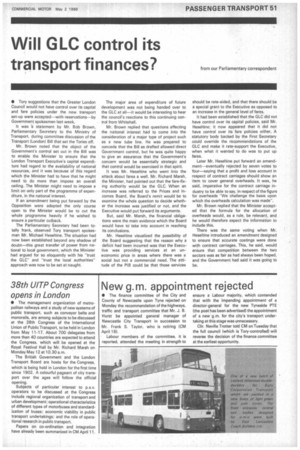Will GLC control its transport finances?
Page 53

If you've noticed an error in this article please click here to report it so we can fix it.
from our Parliamentary correspondent • Tory suggestions that the Greater London Council would not have control over its capital and fare policies under the new transport Set-up were accepted with reservations—by Government spokesmen last week.
It was a statement by Mr. Bob Brown, Parliamentary Secretary to the Ministry of Transport, during committee discussion of the Transport (London) Bill that set the Tories off.
Mr. Brawn noted that the object of the Government's control set out in the Bill was to enable the Minister to ensure that the London Transport Executive's capital expenditure had regard to the availability of national resources, and it was because of this regard which the Minister had to have that he might need to do more than impose an overall ceiling. The Minister might need to impose a limit on only part of the programme of expenditure, in the national interest.
If an amendment being put forward by the Opposition were adopted the only course open to the Minister would be to cut the whole programme heavily if he wished to ensure a particular cutback.
The Parliamentary Secretary had been totally frank, observed Tory transport spokesman Mr. Michael Heseltine. The situation had now been established beyond any shadow of doubt—this great transfer of power from national to local government, which the Minister had argued for so eloquently with his "trust the G LC" and "trust the local authorities" approach was now to be set at naught. The major area of expenditure of future development was not being handed over to the GLC at all—it would be interesting to hear the council's reactions to this continuing control from Whitehall.
Mr. Brown replied that questions affecting the national interest had to come into the consideration of a major type of project such as a new tube line. He was prepared to concede that the Bill as drafted allowed direct Government control, but he was quite happy to give an assurance that the Government's concern would be essentially strategic and that control would be exercised in that spirit.
It was Mr. Heseltine who went into the attack about fares a well. Mr. Richard Marsh, the Minister, had pointed out that the fare-fixing authority would be the GLC. When an increase was referred to the Prices and Incomes Board, the Board's remit would be to examine the whole question to decide whether the increase was justified or not, arid the Executive would put forward its arguments.
But, said Mr. Marsh, the financial obligations were the main evidence which the Board would have to take into account in reaching its conclusions, Mr. Heseltine visualized the possibility of the Board suggesting that the reason why a deficit had been incurred was that the Executive was providing services at an uneconomic price in areas where there was a social but not a commercial need. The attitude of the PIB could be that those services should be rate-aided, and that there should be a special grant to the Executive as opposed to an increase in the general level of fares.
It had been established that the GLC did not have control over its capital policies, said Mr. Heseltine; it now appeared that it did not have control over its fare policies ether. A statutory body backed by the First Secretary could override the recommendations of the GLC and make it rate-support the Executive, when what it wanted to do was to put up fares.
Later Mr. Heseltine put forward an amendment—eventually rejected by seven votes to four—saying that a profit and loss account in respect of contract carriages should show an item to cover general overheads. It was, he said, imperative for the contract carriage industry to be able to say, in respect of the figure for overheads "We challenge the basis upon which the overheads calculation was made".
Mr. Brown replied that the Minister accepted that the formula for the allocation of overheads would, as a rule, be relevant, and he would therefore expect the information to include this.
There was the same voting when Mr. Heseltine introduced an amendment designed to ensure that accurate castings were done with contract carriages. This, he said, would ensure that competition between the two sectors was as fair as had always been hoped, and the Government had said it was going to be.




















































































































































































































